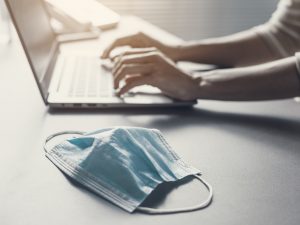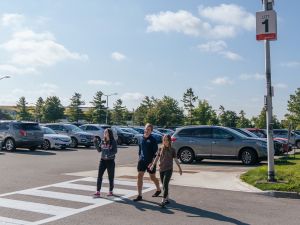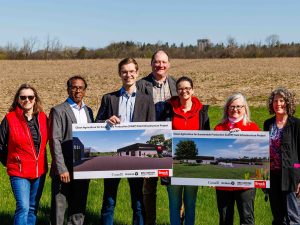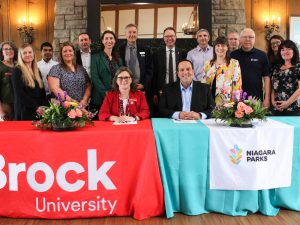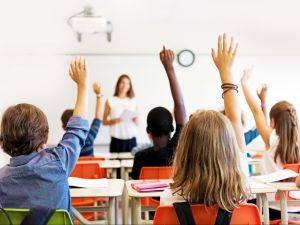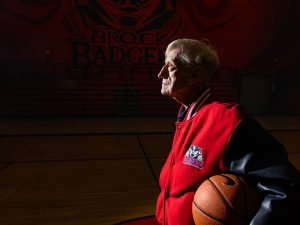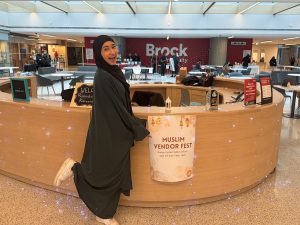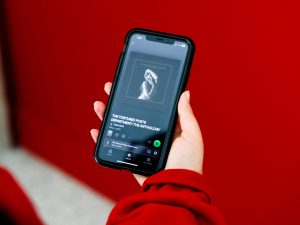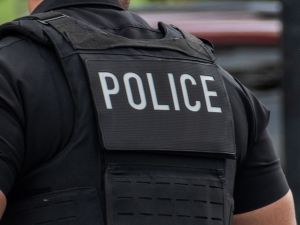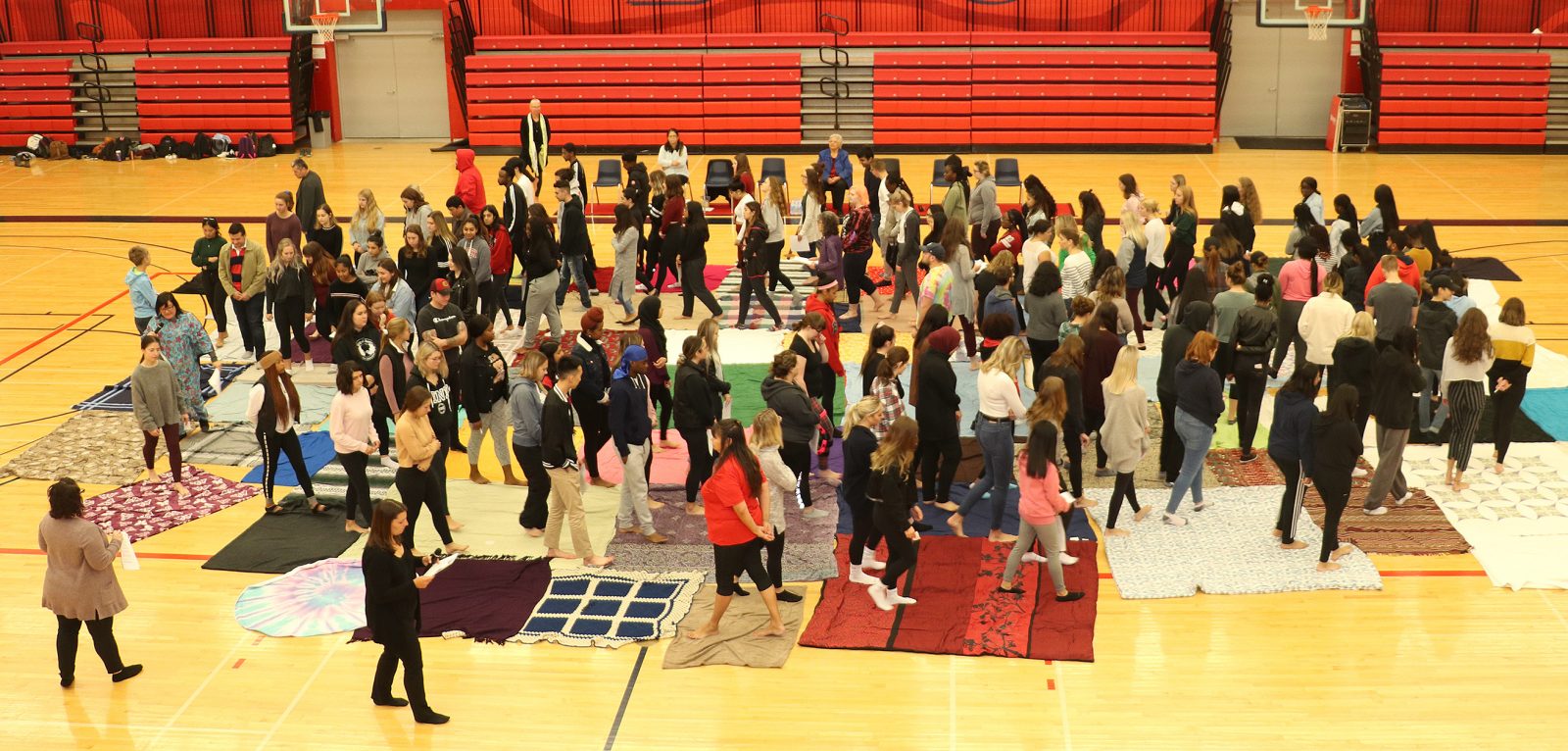 Students in the Health of Canadian Society course took part in an experiential education exercise, which saw participants standing on blankets that were continuously folded to represent the loss of land that took place between the arrival of Europeans and present day.
Students in the Health of Canadian Society course took part in an experiential education exercise, which saw participants standing on blankets that were continuously folded to represent the loss of land that took place between the arrival of Europeans and present day.An eye-opening experiential exercise examining centuries of systemic abuse faced by Indigenous peoples drew Brock University students out of their classrooms and left many in tears Wednesday, Oct. 9.
As they came face-to-face with the horrors of Canada’s colonial past and treatment of Indigenous peoples, Public Health and Biomedical Sciences students at Brock participated in an experiential reconciliation exercise designed to educate on the legacy of abuse, neglect and resistance.
The Health in Canadian Society course in the Department of Health Sciences aims to explore how various societal factors influence health and well-being at individual and population levels.
For Assistant Professor Valerie Michaelson, accomplishing this goal meant providing her students with an awareness of the severity and complexity of First Nations, Inuit and Métis health issues in Canada, as well as the resilience of those communities and individuals.
“You can’t have reconciliation without truth, and the truth is really hard to hear,” said Michaelson. “Many of us have benefitted from this system that has marginalized so many other people.”
The 90-minute KAIROS Blanket Exercise saw participants standing on blankets that were continuously folded to represent the loss of land that took place between the arrival of Europeans and present day. Parts of the activity were also designed to simulate losing a child to the residential school system and encountering many of the other abuses forced upon Indigenous peoples from the 15th century until the present.
Medical Sciences student Veronica Zajic said she encountered unexpected emotions as the narrative of the exercise progressed.
“I felt so sad when I saw everyone being separated, losing their land and experiencing so many other injustices,” she said of the simulation’s removal and dispersal of most participants from the blankets that symbolized their traditional nations. “It was devastating. But we were also told at the end to not carry the burden of the past with us, and to instead work on what we know how to change within the framework of what we had learned.”
For Zajic, who aspires to work as a medical professional, that change comes in bettering the way Canada’s health system cares for Indigenous peoples.
“Awareness is key,” she said. “We don’t do enough for the health-care needs of Indigenous people, and exercises like this one help us begin to bridge the gaps and better understand their needs.”
Sandra Wong, Aboriginal Academic Support Program Co-ordinator/Instructor, said the exercise delivers a powerful narrative that provides insight into many of the contemporary issues experienced by Indigenous people.
“The historical issues we explore offer insight into why we have so many problems with mental health, drug and alcohol abuse, and sexual abuse in our community,” she said.
With the exercise narrated by Queen’s University Cultural Safety Co-ordinator Laura Maracle, Wong said it highlighted the importance of working together to provide the best possible education for those taking part.
“We have to promote whatever type of learning needs to be done for our people,” she said. “It’s not competitive and we want to work together. We want our Aboriginal kids (First Nations, Métis and Inuit) and non-Aboriginal kids to learn the history.”
Along with Wong, other members of Aboriginal Student Services and representatives from the University’s Human Rights and Equity Office were in attendance to provide support and perspective to participants in need, as well as leading reflective circles when the exercise finished, which offered a safe space for each student to speak about what they learned.
Brock’s Associate Director of Experiential Education Sandy Howe said simulations like the KAIROS Blanket Exercise represent a key portion of Brock’s experiential goals.
“Having the opportunity to explore our Canadian history in this way has had a profound impact on the participants involved,” she said. “But activities like these are not possible without taking the time to build true partnerships on campus with Faculties and the Centre for Pedagogical Innovation (CPI) and follow the leadership of Aboriginal Student Services.”
Though the exercise is now complete, Michaelson plans to continue to draw on its content to allow students more time to process their thoughts.
“It’s the first piece in a multi-week module about decolonization, reconciliation and health,” she said. “When you see the lights come on in students’ minds as they hear the truth for the first time, it’s incredibly powerful. We want to allow them time to fully reflect on what they have learned within the context of the class as well as on a personal level.”
That reflection was just beginning for Zajic, who said she had a lot to process.
“It was really grounding to hear of the suffering that still continues,” she said. “It made me feel connected to the tragedies of the past and ready to work for a better future.”
